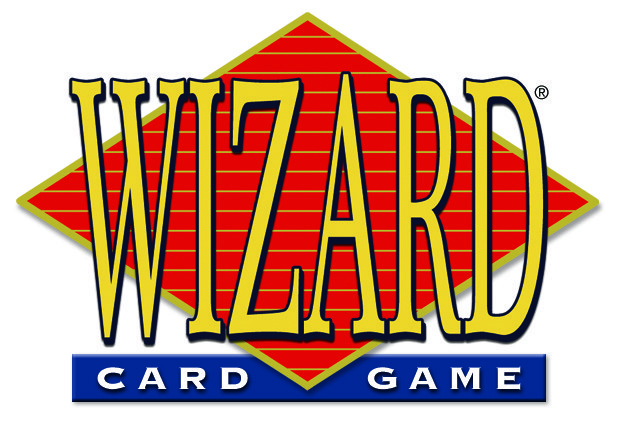Wizard FAQ

Frequently asked Questions
1. What is a Round?
One card played from each player’s hand.
Example: If 4 players: 3 Spades, 8 clubs, 6 Spades, Jack of Spades.
2. What is a hand?
A hand is the number of cards dealt to each player in a round.
Example: In round 2, each player receives 2 cards.
Example: In round 5, each player receives 5 cards.
3. What is the difference between a round and a hand?
A round is one card played from each player’s hand. A trick is the winning, or taking, of all the cards in a round.
4. What is a Trick and who wins the Trick?
A trick is the winning of all of the cards in a round. The winner of the trick would either be the highest value card of the first suit played; the highest trump played; or the first Wizard played.
Example: If 4 players, same as above (Jack of Spades wins).
Example: If Hearts are trump: 4 Clubs, 6 Hearts, 8 Clubs, Queen Clubs (6 Hearts wins).
Example: 3 Spades, 8 Clubs, King of Diamonds, Wizard (Wizard wins).
5. What is Trump?
Trump is the suit card (spade, heart, club or diamond) at the end of the deal turned face up on the remaining pack of cards.
Trump cards win tricks over other suited cards, even higher suited cards.
Example: If card turned up after the deal is a spade, all spades are trump cards.
Example: If 4 players, first player leads 9 of clubs, diamonds, or hearts, and next player(s) do not have a club, they can win trick by trumping with any numbered spade card (provided no one plays a Wizard).
6. What happens if a Wizard is turned up at the end of the deal
instead of a suit card?
Dealer chooses the trump suit after looking at his/her cards before bidding starts. Dealer cannot choose No Trump.
7. What happens if a Jester is turned up at the end of the deal instead of a suit card?
The play is No Trump.
8. Must you always follow suit?
Yes, players must follow suit, if possible, and the suit is determined by the Spade, Heart,
Club or Diamond of the first card played in each round.
Exception: Even though you have a card of the suit that was led, you have the option
of playing a Wizard or a Jester on your turn.
9. Can a player play trump if he/she has a card in the suit that was led?
You can only play trump if you don’t have a card in the suit led.
10. What happens if the trump suit is the same suit as the card led?
Just follow suit. The card is played for its numerical value.
11. What happens if a player cannot follow suit?
If a player cannot follow suit, he/she can play any other suit including trump.
12. What happens if the first card played in a round is a Wizard?
Wizard wins the trick. Players may discard any card they wish.
13. What happens if the first card played in a round is a Jester?
The Jester is a null card, and the suit is determined by the next card played.
14. What happens if the first card played is a suit card, followed
by a Wizard?
Players must still follow suit, if possible, even though Wizard will win the trick.
15. What happens if the first card played is a trump card, followed
by a Wizard?
Players must follow suit, if possible, even though Wizard will win the trick.
16. What happens if the first card played is a suit card, followed
by a Jester?
Players must still follow suit, if possible.
17. What happens if the first card played is a Jester, followed
by a Wizard?
If first card played is Jester and the second card played is a Wizard, the Wizard wins the trick. The Wizard is considered the ruling card since the Jester is a null card. All following players may discard any card in their hand.
18. Can Wizards and Jesters be played at any time?
Yes, anytime at the player’s turn.
19. Do Wizards always win?
Yes, Wizards always win no matter when played during a round.
Exception: If more than one Wizard is played in a round, the first Wizard played wins.
20. Do Jesters always lose?
Yes, no matter when they are played during a trick.
Exception: If only Jesters are played in a round, the first Jester played wins the trick.
21. Can Wizard Card Game be played by just two players?
Yes, but when there are only two players it is more interesting to conceal the bid until after completion of play.
22. How can players keep track of their bid, and the other players’ bids?
The deluxe version of Wizard Card Game includes six bidding wheels. Players indicate their bid on the bidding wheel, and they place the bidding wheel in front of them on the table. As an alternate game, players may also prefer to delay revealing their bids. In this case, bidding wheels are placed face down on the table until after completion of play. Wizard bidding wheels are also available in packages of 6 wheels. Wizard coins are also available, sold in boxes of 25 coins.
23. How do players use the Wizard coins?
After bidding, each player takes the number of coins equal to his/her bid. The player places the coins in front of his space on the table so that the coins are visible to all players. All players now see the number of tricks the player has bid.
When a player takes a trick, the player places one of his coins on top of his trick. Other players now see the number of tricks the player still needs to take by observing the number of coins remaining in front of the player. This eliminates players repeatedly asking, “How many tricks did you bid?” or “How many tricks do you still need to make your bid?”
If a player takes more tricks than bid, there will be no coin placed on the extra trick(s). This indicates to other players that this is an “overtrick.”
24. At the end of each round, do you reshuffle all cards?
Yes, the complete deck of 60 cards is reshuffled at the end of each hand.
25. Why is the Score Pad so small?
The size of the score pad is limited by the size of the card game box. However, we also offer an over-sized score pad, 5½ by 8½ inches, sold separately, and also available as a free download. Besides the larger size for ease of scoring, the over-sized score sheets contain open round circles to mark the next dealer, a divided space to mark tricks both bid and taken, and space to mark the trump suit when a Wizard is turned up at the end of the deal.
26. Where can I download free oversized score sheets?
Go to www.usgamesinc.com/wizard-oversized-scorepads and click on orange BOOKLET icon.
27. How does the scoring work?
The majority of questions we receive relate to scoring. The following will clarify how scoring works.
To win points, you must make your exact bid.
You receive 20 points for making the exact number of tricks that you bid.
You receive an additional 10 points for each trick that you bid provided that you make the exact number of tricks that you bid.
If you are over or under your bid you lose points.
Example: If you bid 0, and do not take any tricks, you earn 20 points for correctly not taking any tricks. This is the one scoring rule that sometimes confuses new players.
Example: If you bid 1 trick and only take 1 trick, you made your bid of 1 trick. You receive 20 points for making your exact bid, plus 10 points for the 1 trick made, total 30 points.
Example: If you bid 4 tricks and make 3 tricks, you are under your bid, and you deduct 10 points.
Example: If you bid 4 tricks and make 5 tricks, you are over your bid and you deduct 10 points for taking one trick too many. Note: You do not receive 20 points for reaching 4 tricks because you exceeded 4 tricks, i.e. you didn’t make your exact bid. This is the other aspect of scoring that sometimes confuses players.
Example: If you bid 5 tricks and make only 2 tricks or you make 8 tricks, you lose 30 points, i.e. 10 points for each trick under or over your bid.
28. How do you settle a game that ends in a tie score?
The tied players draw one card from the deck to establish the dealer. Ten cards are dealt to each tied player for a tie-breaker round of ten tricks. Players do not announce their bids aloud but write the bid on a slip of paper, or use the bidding wheel, which is turned face down until play is completed.
29. What is the Canadian Rule?
This rule is optional. It states that should the last person to bid also have the highest score on the score sheet (not tied), he/she cannot bid a number that would equal the number of possible tricks in the round. Why the rule? The dealer will likely make an “even” bid so that all players make their bids and he/she remains the leader. When the total bids are higher or lower than the total tricks available someone must lose points after the play of the hand.
Exception: This rule does not apply if there is a tie for the lead.
Exception: The last bidder and leader may bid zero even if it results in an “even” bid.
30. What happens if a player reneges (i.e. does not follow suit when required to do so)?
If noticed before another card is played, no penalty.
If trick is completed and the mistake then discovered, players automatically make their bids except the player who reneged loses 20 points.
31. Is there a Wizard App?
Yes, there is a wizard app that can be downloaded. For Apple iTunes, go to Wizard Card Game. For Android Google Play, go to Wizard Card Game.
32. How can I locate or host a Wizard Game Night or local Wizard tournament?
Contact [email protected]
33. Can Wizard Card Game be played online?
Yes, go to www.wizardcards.com and click “Register Here.” Then go to “I agree that I am 13”, and “I agree” to registration terms, and fill out registration form. If any questions, contact [email protected].
34. What day and time is best to find players online?
Usually evenings 8:00 pm E.S.T., but the best day(s) has not been established yet. Some players prefer weekdays, others weekends.
35. Where can I purchase Wizard Card Games and related items?
You can purchase Wizard Card Games, over-sized score pads, bidding wheels, coins, and variations of the game at your local store, or https://www.usgamesinc.com/Cards_and_Games/wizard-card-games/
For further questions, email [email protected]


